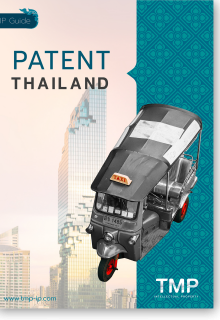Patent
A company that hasn’t registered a patent for its new invention is vulnerable, no matter how much ingenuity, efforts and financial resources were invested into its conception. Indeed, if the product meets the company’s expectations and generates good sales, competitors would normally attempt to launch a similar product in order to enter the market and obtain their shares of the benefits. In the worst case scenario, the competitor won’t merely share the market but simply take it over, thanks to better marketing or newly added features, for instance.
Unfortunately, we know from experience that many companies, especially SMEs, are reluctant to initiate the procedure to obtain a patent at the beginning of the product development. Yet, in today’s rapidly evolving business world, patents are both a shield and a sword indispensable to all companies to remain and thrive in their respective market areas. If they fail to register patents for their novel products, they won’t have any tool to prevent competitors from copying their inventions.
With three patent attorneys and technical assistants having a scientific background in the most crucial fields, we are perfectly prepared to assist the owners of technology to obtain patents and petty patents (or utility model) in Thailand and other foreign countries.
Here is how we can help you navigate this Patent Registration process:
Patent Registration Process in Thailand
Before registration
Patent search
The search covers patents published and registered in Thailand and other information made available to the public.
We will then prepare a report summarizing our findings and assessing the novelty of the claims vis-à-vis prior inventions.
Drafting the claims
We ensure that your interlocutor in this process is experienced and conversant in the field of your invention.
Translation services
Our patent agents provide efficient and accurate translation services.
Filing & monitoring your application
Please contact us to obtain a full quotation covering all services from filing to grant of the patent at the DIP.
Once the application has been filed, we will monitor it free of charge, which may involve forwarding eventual office actions and advising you of the best course of action, informing you when the publication fee must be paid and when the substantive examination request can be filed.
After registration
Monitoring your patent
We will monitor your patent free of charge, which may involve informing you when the annuity fees are due and forwarding you any invalidation or cancellation action filed against your patent.
Patent rights enforcement & litigation
You can trust our professionals for all infringement cases, from collaborating with local enforcement authorities to defending your rights in court or representing you during arbitration or mediation procedures.
Licensing & assignment
We can assist you in drafting and recording agreements matching your business plans and safeguarding your rights.
Foreign filing
With a wide network of trustworthy associates all over the world, TMP-IP can also handle efficiently your foreign filings.
Registration process for patent (simplified)
Drafting, translating and filing the application (1 week)
To register a patent or petty patent in Thailand, an application must be filed by the applicant or his/her agent with an office or address in Thailand at the DIP or via the DIP online filing platform. An official application fee must be paid on the filing date. The Thai translation of the abstract and claims should be submitted on the filing date. The rest of the translation as well as the formal documents (power of attorney, deed of assignment, simply signed statement of applicant’s right – as the case may be) may be submitted within 90 days from the date of filing the application.
Formal examination (18 months)
Following the filing of the application, the Thai Patent Office will undertake the preliminary examination or formality check of the application. This will ensure that all documents have been correctly filed and that the invention for which a patent is sought is within the scope of the Patent Act. If there is any formal issue, the registrar will issue an office action to ask the applicant to amend the application within 90 days.
Publication (90 days)
If the application complies with the Thai Patent Regulations, the applicant will be asked to pay the publication fee within 60 days of receiving corresponding notice. If the applicant fails to pay the publication fee in these 60 days, a second (and last) notice will be issued, granting the applicant another 60 days to process the payment. Once the publication fee has been paid, the application is published in the Thai Patent Gazette. Third parties may file an opposition against the application within 90 days from the publication date.
Substantive examination (2 to 4 years)
Once the application is published, the applicant must file the request for substantive examination within 5 years from the publication date. To speed up the substantive examination process, it is advisable to submit a copy of the foreign search report issued in the examining country. If the examiner has to conduct the search on his own, the examination will last longer.
Grant (1 month)
If all necessary amendments have been made and the substantive examination is satisfactory, the applicant will receive a notice to pay the fee for the grant of the patent within 60 days from the receipt date of the notice. Once the fee has been paid, the patent is issued in the following 15 days.
Access and download our Thailand Patent guides to acquire basic knowledge on current rules and regulations pertaining to registration, prosecution and Patent rights enforcement in Thailand.
YOUR QUESTIONS
Our answers
The grant procedure for petty patent is significantly simpler and shorter. The formal examination lasts only 6 to 10 months, after which the applicant will have to pay the publication fee together with the grant fee. The patent will be granted subsequently. The substantive examination request is optional and can be filed by the patentee or any third party within 1 year from the publication date.
The ASEAN Patent Examination Cooperation (ASPEC) is a patent work-sharing program implemented in 9 ASEAN IP offices (Brunei, Cambodia, Indonesia, Lao PDR, Malaysia, the Philippines, Singapore, Thailand and Vietnam), operational in Thailand since 2013. It promotes the use of search and examination reports or PCT reports issued by another participating IP office to speed up the examination by the IP office designated subsequently. It is free of charge for the applicant.
The Thai DIP and the Japanese Patent Office (JPO) are cooperating since 2014 to accelerate the substantive examination of patents based on prior applications filed in Japan or Thailand. This pilot program is currently in force until December 2021 and has already been extended 3 times by 2-year periods.
A PCT applicant may request restoration of the national phase application in Thailand within 2 months after the event that caused the process to be delayed or within 12 months after the priority period of 30 months, whichever expires first. However, the applicant must provide a justification for having failed to file the application within the priority period.

